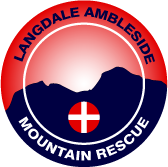"...what did you do in the early days with the bodies of the dead that you picked up off the fells?
R. Well, we just used to take them and put them in the garage up at Dungeon Ghyll or else - one young chap that got killed up at Kirkstone and we . . . 'cos we had to have them nearest the place of the accident you see for the coroner as I told you before and yes, and we came down to the farm and asked them if they had a place where we could put this corpse and he says "The only place I have is a duck'ole."
I. A what?
R. A duck'ole, where the pigs were, yes. And you know what it was? It was an earth lavatory - you know those old earth lavatories they had at these farms, where they had a little square hole to empty it at the back. Well, you know, I'll never forget this, that's why I got it going to have a mortuary in Ambleside because this farmer says "You can put him in my duck'ole, there's no ducks in", and he put a pig creel that you put a pig on, you know, put that in the duck'ole and put some straw down and put that body on that pig creel in that duck'ole, you know, just as they'd been, we'd to leave them in those days as they've been lain. And his father was a butcher from Preston and he'd to go in through this little square hole where they used to empty these earth lavatories with a candle and identify his son on this pig creel and he came out - he was broken hearted was this chap. He says "If his mother saw him in there, she'd never get over it". And it's always stuck in my mind did that, you know - what a horrible thing for anyone to go and that's why I - we - used to go down and attend to them - make them respectable for when the relatives came to identify them. And there was one old lady from Grasmere, she died up at Grasmere and she had a bunch of celandines in her hand when she died. She was picking flowers. And I took her from Grasmere and brought her down to the mortuary and I laid her out and I put that bunch of celandines in her hand as she'd been picking them and we got a letter from her people thanking us for making her so nice, you know. Making it so nice for them to come and identify her. It makes a big difference, you know, for them to see. . ."
From the Ambleside Oral History Group archive


